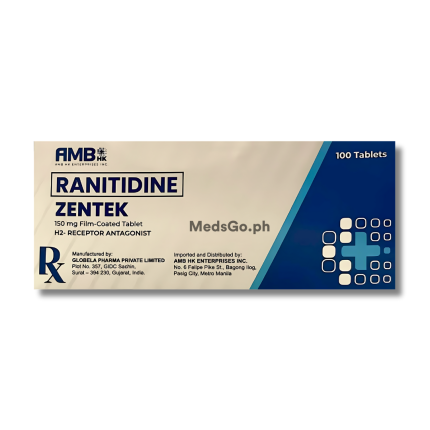Indications / Uses
ZENTEK Ranitidine 150mg is used for the management and prevention of ulcers in the stomach and intestines, including those associated with non-steroidal anti-inflammatory drug (NSAID) use. It provides relief from conditions like chronic episodic dyspepsia and the symptomatic discomfort of gastroesophageal reflux disease (GERD). This medication is also indicated for the treatment of acute reflux esophagitis, post-operative ulcers, and specialized hypersecretory conditions such as Zollinger-Ellison syndrome. It works by acting as a histamine H2-receptor antagonist, which significantly decreases the amount of acid produced by the stomach.
Formulation / Ingredients
ZENTEK Ranitidine 150mg contains: Ranitidine 150mg
Do I need prescription to buy ZENTEK Ranitidine 150mg?
Yes, you need a prescription. But if you don't have one, you can get a free teleconsultation from MedsGo Physician. Just make an order and our Physician will call you back.
Side Effects
ZENTEK Ranitidine 150mg common side effects include: headaches, diarrhea, constipation, and feelings of tiredness or dizziness. Occasionally, patients may experience skin rashes, nausea, or stomach discomfort. While rare, more severe effects have been reported, such as reversible confusion, particularly in older patients or those with existing kidney or liver impairment. Hypersensitivity reactions, joint and muscle pain, and changes in blood cell counts have also been reported, but these are infrequent and typically resolve upon stopping use.
Directions and Dosage
- Dosage for Adults (18+ years): For active ulcers and GERD, the dosage is 150 mg twice daily. Alternatively, 300 mg may be taken once daily at bedtime. For more severe erosive esophagitis, the dosage may be increased to 150 mg 4 times daily. For specialized hypersecretory conditions, initial dosing is 150 mg three times daily, with adjustment possible up to 6 g per day in severe cases.
- Dosage for Kids 1 month - 16 years (Ulcers): The oral dose is 2 to 4 mg/kg twice daily. Do not exceed 300 mg per day.
- Dosage for Kids 1 month - 16 years (GERD/Esophagitis): The oral dose is 5 to 10 mg/kg per day, usually divided into 2 doses. Do not exceed 300 mg per day.
Treatment for ulcers is typically 4 to 8 weeks. Maintenance therapy, for example, 150 mg once daily at bedtime, is recommended to prevent recurrence.
Contraindications
This preparation is strictly avoided by individuals with a known hypersensitivity or allergic reaction to any of its components. It is also contraindicated in people who have a history of acute porphyria, a rare blood disorder, as use may trigger an attack.
Special Precautions
- Before starting therapy for stomach issues, the possibility of a serious underlying condition must be ruled out, as this medicine may conceal symptoms of disease.
- Caution is advised for patients with existing kidney or liver dysfunction, as reduced organ function can increase levels of the medication in the body, potentially requiring lower dosing.
- Prolonged consumption may interfere with the absorption of essential vitamins, potentially leading to deficiency, and long-term use requires careful monitoring.
- Avoid using this medication if there is a known history of acute porphyria, as it may precipitate an attack.
Is it safe to take it with other medications?
This preparation does not typically interfere with drugs metabolized by the liver’s enzyme system, such as some anti-seizure or heart medications. However, because it reduces stomach acid, it can decrease the effectiveness of other medications that require acid for proper absorption. High doses of certain antacids may also decrease how well this medicine is absorbed.
How should I store it?
Keep the tablets stored away from moisture and direct heat. It should be kept at a controlled room temperature, ideally between 15°C and 30°C.
Used For
- Acid reflux treatment
Age
- From 1 month
Features
- Ranitidine
Reviews
No reviews found
Pharmacist answers to questions about ZENTEK Ranitidine 150mg - 1 Tablet


